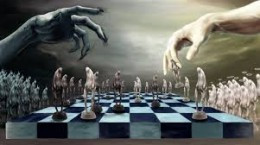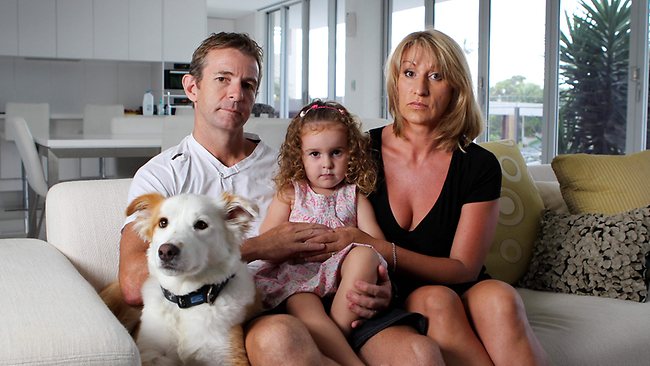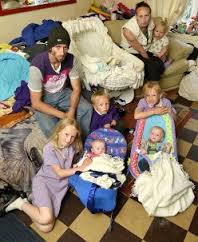What is your Sterotype when you see a large family of 4 children or a small fami
What is your Sterotype when you see a large family of 4 children or a small family of just 1
child
Do u judge I dont judge on family size at all or those without children at all but I guesse this is a thing nowNo, it USED to be a research thing taught in sociology and psychology from WWII up until about the year 2,000 (I did some of the research). Research now is showing much less effect of number of children in a family, except in a segment of the families receiving public assistance. That, I think, is the origin of so much bad mouthing of "large" families in some communities - anger at welfare recipients for "wasting our tax money", anger of some folks at not receiving public aid when "those families" receive it, anger at certain ethnicities with more than a couple of kids per family, anger at the Duggar family for delivering "as many Republican babies as possible" in the words of some pundits, and other reasons.
The prejudice against childless people in some communities is unacceptable and makes me angry.
In addition, research beginning in in the 2000s has amassed enough proof in the last two decades to show that birth order of children has little or no affect any longer as well. However, the *only child* still seems to be unique in some characteristics.
Bless you for not caring about family size in your interactions with people!I agree that 1 or 10 doesnt matter its what you instill in your children Kindness,hope and encouragement
When it comes to large families, I assume a greater degree of religiosity.
I only know of one atheist who intentionally had five children with his wife, though a few had multiple illegitimate children with as many women.I think hollywood has given people this stero type with our 4 children my husband is an atheist and I beleive but have no Practiced religion.
Tamara, you're correct as usual. Large families are fundamentally religious. They are also very conservative, even reactionary in their politics. They are also insular & parochial, if not backwards in their purview. Again, seen this firsthand!
For every person who "busies" his brain by thinking about what other people do and/or by assuming one or another thing about someone he sees, there are any number of others who aren't spending their time and brain, thinking about what other people do or don't do.
First, someone with no, or one, child may just not have started their family yet at all (so that means "assume nothing" about them). The same applies to someone with two children. Then, nobody knows if several children are even the same parent's child, but if, for some reason, someone has several - none of anyone's business and one can't assume what those reasons might be.
My children are grown now, and they're nicely spaced; but if someone were to assume SOME things they'd be a good chance they assumed wrong. For example, my eldest son happens to be adopted, but not because I couldn't have children myself. Then again, when my three kids were young there were people who automatically assumed they were all biological children/siblings and would say how one or both of them had "the same eyes" or "same build" or "same veins in their temples". More wrong assuming.
My thing is this: I have my family (no grandchildren yet), so I'm not even paying attention to other people and how many kids they have. When my kids were younger I was too wrapped up with my own life and theirs and them to think about who had how many kids. It's not that I don't notice a particularly cute little kid or toddler when I'm out. I do, and I like them and enjoy seeing them; That's the extent of my noticing anyone and their child, though.
( I said this in another answer recently): Being a mother/parent is not high school. There are more things to think about than a) what someone else is assuming about us and our children, and/or b) other people and their kids (unless, of course, their child/children is in danger or maybe (I'll admit to this) being aggravated if they can't/won't properly supervise/watch their children and their kids do something like destroy someone's garden or property or do something that hurts someone else. That's not "assuming", though. It's "disapproving" of those kinds of things I mentioned - a whole different thing. I've known more than one person who has only one or two children and who haven't been able to teach them to behave better; so again, stereotyping/assuming based on number of children is misguided (and often someone else's big ego trip).Me Too, i honestly never think one thing or the other based on family size, dress or anything like that.I look at is this child kind, caring,is this child a good playmate for my children, doesnt matter anything else.

Large families are categorized by sociologists of 5 children or more per family.The stereotype of large families is oftentimes less educated parents.There are further stereotypes of children raising each other because parents don't have the emotional resources to give their children the individualized love & attention they need.Frequently in large families, oldest or older children are the parents.Parentified children are quite common in large families because parents don't have the span of control as the ratio of children are more than the ratio of adults.In such families, parents are less involved in their children's lives, again the common phenomena of children raising themselves & each other. Because parents are overextended in their dealing w/children in large families, there are harsher forms of discipline, including physical abuse which is rife in these families.
In large families, there is poverty as there is very little monies for rudiments, let alone anything else.Socioeconomic want & struggle is the stereotype of large families.Think of the tv show The Waltons. The Waltons is the quintessential large family.Children have to work early because their parents can't get the what they need.Oldest or older children must quit school in order to work, supplementing family income. The stereotype of children in large families is that they are bedraggled. They are seen as unhealthy because they don't have the proper nutrition & medical care.They wear secondhand, even castoff clothes because their parents can't afford to purchase new clothes. Another stereotype is that children in large families aren't exposed to cultural & intellectual activities hence they are viewed as uncouth & intellectually backwards. They are considered as street instead of cultured.
Stereotypes of small families of 1-2 children are that the parents are highly educated, affluent, & liberal.In such families, education & achievement are emphasized. Children in such families are exposed to intellectual & cultural activities because there is more discretionary income.They are likely to attend college & pursue graduate education.Parents are involved in their lives & give them individualized attention.Such children are healthy because of proper nutrition & medical care. They also have the best clothes. They are seen as well-behaved because of being in an adult environment. They are also intellectually astute because they primarily interact w/ adults. Parents of small families use more constructive, educational forms of discipline on their children. They TALK to their children more.I see that alot of people have different stero types
my friends point of view on an only child is that they are unsocialized and greedy, and not empathetic towards others.I dont Believe in any Of the Stero types myselfIt's a stereotype because it's TRUE.Children in large families oftentimes look like impoverished orphans, bereft of care while children in small families are well put together & loved by their parents.Seen IT firsthand & know from experience.
When I see people with large families (4 or more children), I sometimes envy their abilities as a mother. I think to myself, wow, I couldn't do that, not because I wouldn't want to, but because I don't have the time, energy, or patience. I wonder what secret "mom" trick their hiding that enables them to be super women/moms!!
thats very nice, but we really dont have any secret mom magic, our lives are the same krazy hectic like all moms out there.
@Ashley, c'mon now, mothers of large families DON'T parent their children.They give birth & hand the child to the oldest/older children to parent. Mothers of large families have it SO EASY. Never seen mothers of large families parent their childr
Someone should let moms of many children know they should be having it easy , i dont think that they are aware
THEY have it made. They just give the children to the oldest/older children to parent. Mothers of large families ALWAYS do this.They NEVER raise nor parent their children. Ask any oldest/older children? They have STORIES to tell a/k/a Cinderella!!
Grace, The Cinderella story was a small family and they were well of,with lots of money. I don't believe that this is the reference you were looking for.
I am discussing how parents use oldest children as slaves to them & their siblings. How oldest children DON'T have an individual life, childhood, & time. They are ON 24/6/365 like Cinderella. They are also TREATED THE WORSE- NOW GET THE PICTU
I guesse I haven't seen that in my experiences, sorry
IT'S commonplace in large families for oldest/older children to parent & raise their siblings. Large family moms NEVER parent their children, they're given to their OLDEST/OLDER children. All moms of large families DO THIS........
Not a stereotype at all but truth. To add, parents of large families are less concerned about the future welfare of their children educationally & socioeconomically. Parents of large families are LESS intelligent & more base in their psychological nature. They are more immature i.e. they think of their needs & wants, not caring about the ramifications of their actions on their children. They demand that their children assume adult roles in childhood because they are so infantile as parents, having more children than logically feasible. In large families, children are the parents while parents are the children. In the large family environment, children exist for the benefit of the parents.
In large families, there is child neglect as this is quite common in large family environments. There is also child abuse, again common in large families as parents don't have the time & expenditure to devote to each child. Parents are uninvolved in the daily lives of their children. Parents are abrupt w/their children, oftentimes viewing them as noisome obligations & as nuisances at worst. There is so much crowding that parents can't wait for some of them to leave home. There is a high incidence of throwaway children in large families because parents cannot adequate support them. Parents see their children as objects, not people. There is typically dehumanization of children in large families. They aren't seen, treated, & loved as individuals but are viewed as part of a mass.
Children are raised to believe that they as individuals are nothing. They have little or no sense of self nor self-esteem. They have a poverty mentality & have no ambition to improve themselves educationally nor socioeconomically. They are happy w/nothing or next to nothing. They are content being poverty stricken & living a primitive existence.
In small families, parents are extremely concerned about their children & will go to any lengths to give their children the very best of opportunities to thrive as individuals. Parents are selfless i.e. putting their children's welfare first & foremost. They are HIGHLY intelligent, knowing how important family planning is, especially for the present & future well-being of their children. In small families, parents exist for their children.
Also in small families, children have high self-esteem & a sense of individuation. They are encouraged to achieve educationally & socioeconomically. They are cultured & aspire to the higher human needs such as self-actualization & a love of beauty. They are loved & seen as precious by their parents. They are not seen as burdens by their parents like children in large families are. Their parents enjoy being w/them & make sacrifices for them.
There is discussion in the home. There is also no abuse nor forms of corporal punishment as parents have the time & expenditure to discuss things w/their children. There is cultivation & an appreciation for the civilized & cultivated life in small families. There is an appreciation of life beyond a bare rudimentary existence. Children from small families want the best because they were reared to have the best. They don't have a poverty mentality but a prosperity mentality.
Abuse is commonplace in large families as parents are overwhelmed by the number of children they have. There is no or little time for discussion so when things go awry, parents resort to harsh punishments. Parents have little or no involvement in the daily lives of their children.
In small families, children are cherished & loved. Parents have the resources to give their children the individualized love & attention the latter need. There is little need for harsh punishments as parents have the time & resources to discuss & constructively discipline their children.Another stereotype that people have when they see a large family(6-more children per household) is that children are ill-behaved & unruly, even feral w/the parents constantly shouting & screaming at them. The children oftentimes act out because they never have their needs met. When people see a small family (1-2 children per household), such children are mature, well behaved & a joy to be with.
People's stereotype of small families (1-2 children per household) is that:
Small families are for the most part well-kempt & well dressed-concerned about their personal appearance-meticulous. Small families believe in looking their best & they are interested in clothing & fashion. Personal appearance & looking their best are of UTMOST importance to them. They have a pride in looking their best. They want to look fashionable.
People's stereotype of large families(6-more children per household) is that:
Large families are for the most part ill-kempt & bedraggled- unconcerned about their personal appearance-slovenly. Large families could care less about looking their best & they are uninterested in clothing & fashion. Personal appearance & looking their best AREN'T important to them. They take pride in looking their very worst. It is nothing for such families to wear shabby, threadbare, & unfasionable clothing.
Related Discussions
- 26
Why do parents of large to very large families tend to delegate the raising of t
by Grace Marguerite Williams 7 years ago
Why do parents of large to very large families tend to delegate the raising of the youngerchildren to the oldest sibling? Many parents from large to very large families (6 or more children) state that they have little or no part in raising their children, they purport that they...
- 16
Who play a vital role in the up-bringing of the child,the Mother or Father?
by Folorunsho Joshua 7 years ago
Who play a vital role in the up-bringing of the child,the Mother or Father?
- 176
What do you think of woman with more than 8 children?
by Money Fairy 11 years ago
Do you think a woman with more than 8 children has a mental problem?Isn't it just a little insane to have so many children? Unless you are a gazillionaire how on earth could you afford so many children? And how much time would you really have to spend with them ?Just curious if anyone else thinks...
- 37
The Psychology of the Large Family
by Grace Marguerite Williams 10 years ago
The large family of 6 or more children is becoming outmoded. The large family usually have a diametrically different culture and milieu to that of the small family. Parental interaction is rare to nonexistent. As a result of this little or none parental...
- 10
Why don't people care for their kids anymore??
by igniter8503 8 years ago
Why don't people care for their kids anymore??In today's world we see more parents not taking care of their kids the right way either ditching them with other people to take care of or no caring for them in general why do you think this???Their is more kids growing up in foster care or with grand...
- 5
How To Take Care Of A Large Family
by Andria 12 years ago
How To Take Care Of A Large Family











